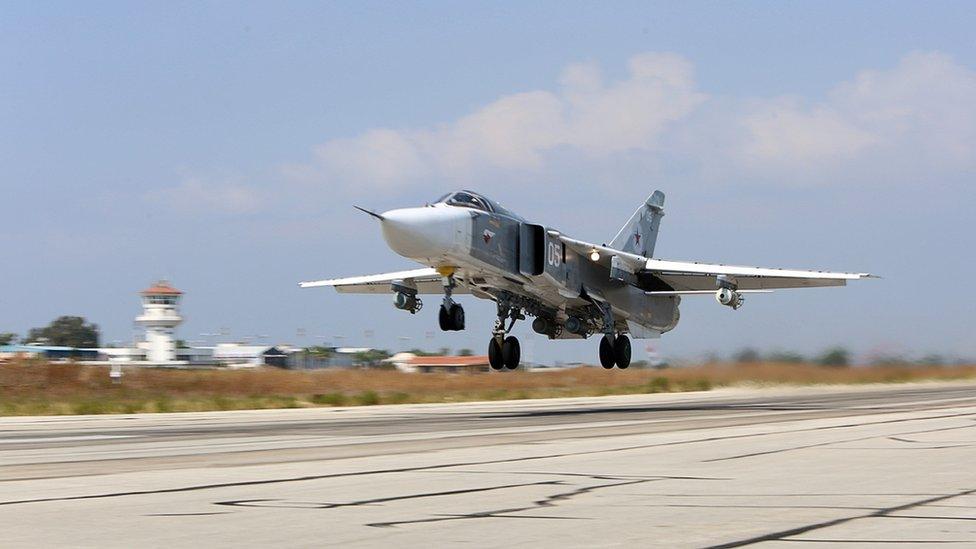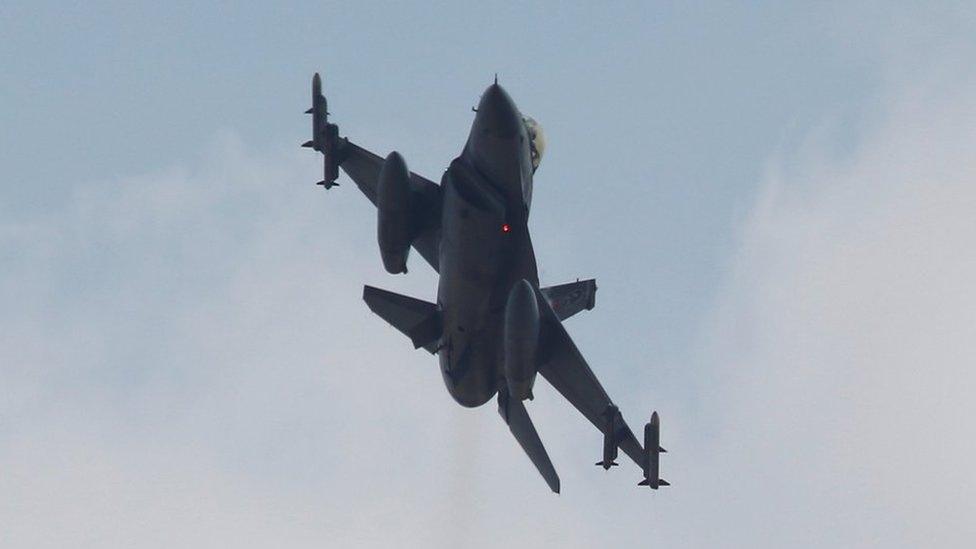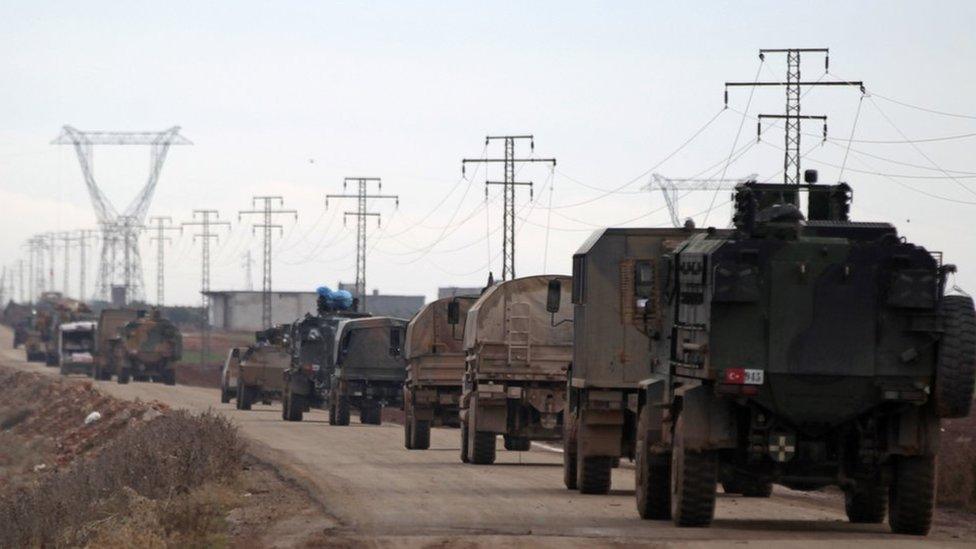Syria conflict: Russia and Turkey 'in first joint air strikes on IS'
- Published
- comments

Russia has jets stationed at Hmeimim air base inside Syria
Russian and Turkish jets have carried out their first joint strikes on so-called Islamic State (IS) inside Syria, the Russian defence ministry says.
IS was targeted in the suburbs of the town of al-Bab, Aleppo province, where Turkey suffered heavy casualties last month battling the group on the ground.
Turkey's military was quoted by Reuters as saying Russia had carried out air strikes "in co-ordination with Turkey".
Russia and Turkey back opposing sides in Syria's five-year civil war.
Moscow intervened militarily in support of President Bashar al-Assad in 2015, while Ankara has funded and armed his opponents.
Al-Bab, about 20km (12 miles) from the Turkish border, has been the focus of a five-month Turkish-backed Syrian rebel campaign aimed at pushing back both IS and Kurdish forces.
US aircraft carried out strikes on the area earlier this week, also in co-operation with Turkey, but a joint combat operation between a Nato state like Turkey and Russia marks a highly unusual development.

Didn't Russia and Turkey fight each other in the air just over a year ago?
Yes, a Turkish F-16 fighter shot down a Su-24 bomber on 24 November 2015, while the Russian plane was on a mission in the Syrian border area. One of the crew was killed while the other was rescued.
This clash between Russia and a Nato state caused a crisis in relations between the two countries, with Moscow imposing sanctions which hurt the Turkish economy.
It only ended after Turkish President Recep Tayyip Erdogan publicly expressed regret.
Since then, the two countries have not only mended economic ties but worked together last month to secure a nationwide truce in Syria that is still in place despite violations.
Along with Iran, they are organising peace talks due to begin in the Kazakh capital, Astana, on Monday.

As complex as ever: Analysis by Jonathan Marcus, BBC diplomatic correspondent

A Turkish tank in action near al-Bab this month
It is unusual, to say the least, for the Russian air force to conduct joint air strikes alongside a Nato member like Turkey.
While Russian sources have listed the aircraft involved, it is still not clear this was a joint operation. For example, did each country's warplanes strike a discrete set of targets?
What we do know is that Turkish ground forces are making heavy weather of their assault on the IS positions in and around al-Bab. Ties between Moscow and Ankara have been warming of late as Turkey adjusts to the Russian-backed recapture of Aleppo by Syrian government forces.
But to complicate the picture further, US warplanes have recently resumed support for Turkish operations in the al-Bab area as well.
Turkey's main strategic goal is to contain the advance of Kurdish fighters who themselves are allies of the Americans. It is seeking to secure a wedge of territory between two Kurdish-controlled enclaves. Syria's battle lines are as complex as ever.

How big is Wednesday's operation?
A Russian spokesman, Lt-Gen Sergei Rudskoi, said nine Russian aircraft and eight Turkish planes had been involved in Wednesday's strikes.

Turkish F-16s are said to have been involved
He listed them as four Su-24s, four Su-25s and one Su-34 on the Russian side, and four F-16s and four F-4s on the Turkish side.
They had hit 36 targets, he added, without giving details.
But he added: "The estimate of the first strikes against IS terrorists has shown that the joint actions of the Russian and Turkish aviation groups were highly effective."
Last month, Turkish military officials said Russian aircraft had carried out three strikes against IS around al-Bab.
Those strikes appeared to be the first Russian support for the Turkish ground campaign.

Is it a surprise to see a Nato state apparently joining forces with Russia?
Relations between Moscow and Nato have certainly been strained in recent years, particularly after Russia annexed Crimea from Ukraine in 2014.
Only last week, the US sent 3,000 soldiers backed with tanks and armoured vehicles to Poland, as a deterrent to Moscow.
Watch the convoy of tanks arrive in Poland
But Turkish relations with the US and other Western powers have deteriorated since the failed coup on 15 July, when the West was accused of showing insufficient support for Mr Erdogan.
American support for Kurdish forces inside Syria has further strained the relationship.
A Nato official referred questions about the al-Bab raids to the authorities in Ankara and Moscow.
"Nato has suspended co-operation with Russia in the framework of the Nato-Russia Council," the official said. "This decision does not affect bilateral or multilateral co-operation that our allies may be engaged in."

How heavy is the fighting around al-Bab?
On 21 December, 14 Turkish soldiers were killed and 33 wounded in a single day of fighting for the town.

Turkish military hardware has streamed into northern Syria in recent weeks
It was the Turkish military's biggest loss in a single day since the start of the rebel offensive aimed at seizing one of the last remaining stretches of the border not controlled by the Kurdish Popular Protection Units (YPG) militia.
The Turkish government considers the YPG an extension of the banned Kurdistan Workers' Party (PKK) and therefore a terrorist organisation.
It has also vowed to prevent the creation of a contiguous Kurdish autonomous region in Syria.
So far, the offensive has stopped YPG fighters advancing west of the River Euphrates and driven IS militants out of more than 1,870 sq km (720 sq miles) of territory, according to the Turkish military.